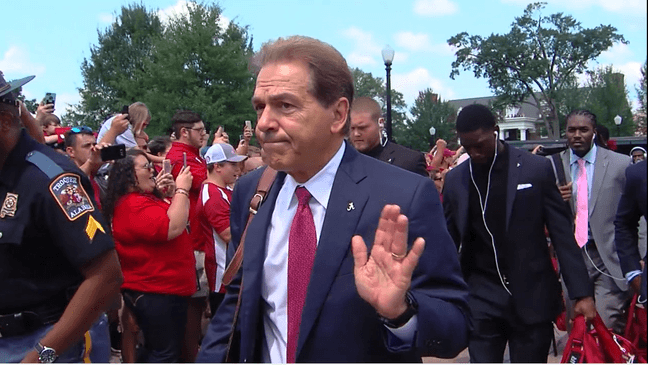Nick Saban’s Greatest Regret: Leaving LSU for the Miami Dolphins
Nick Saban, one of the most successful and decorated coaches in college football history, has had a career marked by championships, accolades, and unprecedented success. His journey from Michigan State to LSU, and eventually to Alabama, is well-documented, and his legacy in the sport is largely defined by the dominance he established at Alabama. However, Saban himself has acknowledged that one chapter of his career stands as a major regret: his decision to leave LSU and take the head coaching job with the Miami Dolphins in 2005.
For many, Saban’s move to the NFL seemed like a natural progression for a coach of his caliber, particularly given his success at LSU, where he led the Tigers to a national championship in 2003. But despite his success in college, Saban’s time in the NFL was far from the fairy tale many anticipated. In fact, it turned out to be one of the more tumultuous periods of his career, and Saban himself has admitted that leaving LSU for the Dolphins was a decision he later came to regret.
The LSU Success: A Foundation Built for Greatness
Before making the leap to the NFL, Nick Saban had already built a solid foundation at LSU. When he took over the program in 2000, LSU was not a perennial powerhouse, but Saban’s ability to recruit top talent and instill a winning mentality transformed the program quickly. Saban’s first few years at LSU were marked by improvement, and by the 2003 season, the Tigers had reached the pinnacle of college football.
In just his fourth season at LSU, Saban led the Tigers to an SEC Championship and a national title, defeating Oklahoma in the BCS National Championship Game. The championship win was a crowning achievement for Saban, and it solidified his reputation as one of the best coaches in college football. He had already proven his ability to turn a program around and bring LSU to the top of the college football world.
Saban’s success at LSU was not just about winning titles, though. His ability to develop players into NFL prospects was another key factor in his success. Players like JaMarcus Russell, Joseph Addai, and Glenn Dorsey were all products of Saban’s coaching, and they would go on to have successful NFL careers. Saban had created a culture of excellence, and his relationship with the LSU faithful was strong. The fans, the players, and the administration were all fully behind him.
Despite all this, Saban made the decision to leave LSU for the Miami Dolphins. While it was a decision that many at the time thought was based on the allure of the NFL, the move proved to be more complicated than it seemed on the surface.
The Miami Dolphins: A Risky Move to the NFL
In 2005, Saban took over as head coach of the Miami Dolphins, signing a five-year, $22 million contract. The move to the NFL was seen by many as a chance for Saban to test himself against the best coaches in the world and to prove that he could succeed at the highest level of football. However, what seemed like an exciting opportunity at the time quickly became a period of frustration.
From the start, Saban’s tenure in Miami was marred by challenges. The Dolphins were coming off a disappointing season in 2004, and the roster was in need of significant improvements. Saban’s first season in Miami saw the Dolphins finishing with a 9-7 record, just missing the playoffs. While the team showed some promise under Saban’s leadership, there were also numerous issues, particularly at quarterback, where Miami struggled to find stability.
The Dolphins’ quarterback situation was one of the primary obstacles during Saban’s time with the team. After the departure of Pro Bowl quarterback Jay Fiedler, Saban had to work with aging veterans like Gus Frerotte and Joey Harrington, none of whom were able to provide consistent play under center. The lack of a solid quarterback led to inconsistent results on offense, and the defense, despite being solid, wasn’t enough to overcome the offensive struggles.
One of the most significant issues during Saban’s time with the Dolphins was the inability to develop and maintain a successful team culture. While he had created a strong, winning culture at LSU, he found it more difficult to implement that same philosophy at the professional level. NFL players are often more established and less inclined to buy into a new system, especially one that comes from a college coach like Saban, whose methods were unfamiliar to many in the league. The adjustment to the professional game, with its different dynamics and challenges, proved to be more difficult than Saban initially expected.
Additionally, Saban faced challenges in terms of the Dolphins’ front office decisions, particularly in terms of personnel. The NFL is a different animal when it comes to roster control and player acquisitions, and Saban was not given the same level of autonomy he had enjoyed at LSU. While he was the head coach, the Dolphins’ front office often made decisions that conflicted with his vision for the team. This lack of alignment between Saban and the Dolphins’ ownership contributed to his growing frustration.
The Decision to Leave: The Regret That Follows
By the end of his second season in Miami, Saban’s dissatisfaction with the NFL was apparent. The Dolphins had gone 6-10 in 2006, and it was clear that his vision for the team was not materializing as he had hoped. In January 2007, rumors began circulating that Saban might be considering a return to college football, and in a shocking move, he announced that he was leaving the Miami Dolphins after just two seasons. Saban’s departure was not without controversy, and his decision to leave the NFL so abruptly left many questions unanswered.
Saban’s decision to leave Miami and return to college football was seen by many as a failure in his NFL coaching career. However, Saban’s move back to the college game would turn out to be one of the most significant decisions of his career. Shortly after his departure from the Dolphins, Saban took over as head coach of the University of Alabama, and the rest, as they say, is history.
Saban’s return to college football marked the beginning of an unprecedented dynasty at Alabama, where he would go on to win multiple national championships and solidify his place as one of the greatest coaches of all time. But despite his remarkable success at Alabama, Saban has always spoken candidly about his regrets regarding his time in the NFL, particularly his decision to leave LSU for the Dolphins.
In interviews, Saban has admitted that he underestimated the challenges of coaching at the professional level. He has spoken about how the NFL is a different world compared to college football, with different expectations, different player dynamics, and a completely different culture. While he was undoubtedly a successful coach in college, Saban learned the hard way that coaching in the NFL wasn’t the right fit for him. The lack of success in Miami and the challenges he faced led him to realize that his true calling was in college football.
Reflecting on the LSU Departure
Looking back on his decision to leave LSU, Saban has acknowledged that leaving a program on the rise, where he had already built a national championship-winning team, was a mistake. The LSU fans, the players, and the administration were all deeply invested in him, and Saban was on the cusp of potentially building a college football dynasty in Baton Rouge. His decision to leave for the Dolphins, driven by the allure of the NFL, is something that he has reflected on with regret.
While Saban’s time with the Dolphins was brief, the impact of his departure from LSU is something that still lingers in the minds of many LSU fans. The Tigers would go on to hire Les Miles as their head coach, and while Miles had success in Baton Rouge, including winning a national title in 2007, there’s no denying that Saban’s departure left a void that took time to fill. LSU was never quite able to replicate the same level of dominance that they had under Saban, although they remained a competitive force in college football.
Saban’s regret about leaving LSU has been evident in interviews, where he has admitted that he should have stuck with the program that he had helped build. However, his time in the NFL ultimately taught him valuable lessons that helped him refine his approach to coaching, and his eventual success at Alabama cannot be overstated. In many ways, Saban’s decision to leave LSU and fail in the NFL has shaped the coach he would become.



